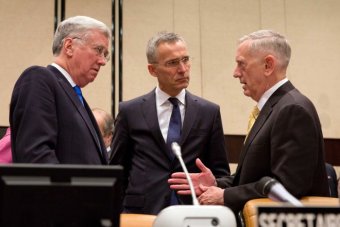US Defence Secretary James Mattis rejects military collaboration with Russia
Updated
US President Donald Trump's Defence Secretary has said he does not see the conditions for military collaboration with Russia, in a blow to Moscow's hopes for repairing ties with the United States following Mr Trump's election.
Key points:
- Rejection appears to close the door on joint military incursions with Russia
- Mattis says Russia interfered in democratic elections
- Russia's President has been calling for more cooperation with both the US and NATO
"We are not in a position right now to collaborate on a military level. But our political leaders will engage and try to find common ground," James Mattis told reporters after talks at NATO headquarters in Brussels.
His blunt rejection came after Russian President Vladimir Putin called for increased intelligence cooperation with the US and NATO, and it makes such coordination less likely at least in the near future.
General Mattis followed his dismissal with a sharp assessment of Russia's alleged election meddling, saying there was "very little doubt that they have either interfered or they have attempted to interfere in a number of elections in the democracies".
His comments raised questions about the Trump administration's policies towards Russia.
As a candidate, Mr Trump repeatedly praised Mr Putin, saying he wanted a new era of cooperation with Moscow.
Speaking at a meeting of NATO defence ministers, General Mattis said the US would continue to engage politically with Mr Putin's government to try to find common ground.
He said political leaders would seek "a way forward where Russia, living up to its commitments, will return to a partnership of sorts here with NATO".
"But Russia is going to have to prove itself first," he added.
The US ceased military-to-military relations with Russia in the wake of Moscow's 2014 annexation of Ukraine's Crimea region.
But last year, the Obama administration considered plans to cooperate militarily with Russia as part of a ceasefire deal in Syria.
Senior Defence Department leaders opposed the plan, and it quickly fell apart as the ceasefire collapsed.
Meanwhile, Secretary of State Rex Tillerson met with Russian Foreign Minister Sergey Lavrov in the highest-level face-to-face contact between the two countries since Mr Trump took office.
The men met on the sidelines of a G20 foreign ministers meeting in Bonn, Germany.
Mr Lavrov was asked whether Russia was concerned about turmoil in the Trump administration. He repeated Moscow's standard line that Russia "does not interfere in the domestic matters of other countries".
AP/Reuters
Topics: foreign-affairs, government-and-politics, world-politics, defence-and-national-security, us-elections, treaties-and-alliances, united-states, russian-federation
First posted









